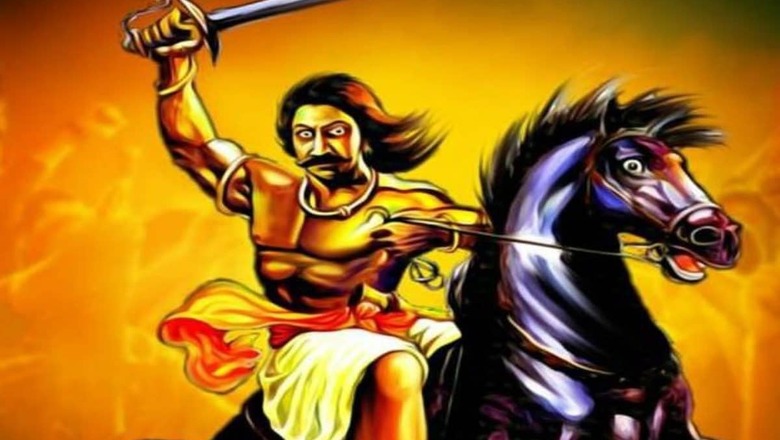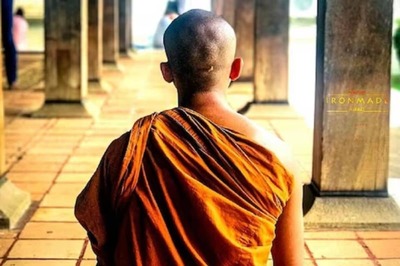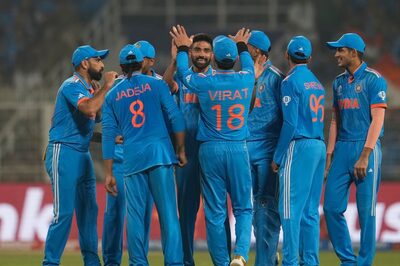
views
For twelve years at a stretch, the British Army faced the resistance of freedom fighter Ondiveeran and received only defeat from this strong warrior, the commander-in-chief of Poolithevan’s army. ‘Ondi’ means ‘single-handedly’ and ‘Veeran’ means ‘brave warrior.’ The valour and strength of Ondiveeran was so much that he single-handedly fought against the enemy and emerged victorious. Thus, he earned the name Ondiveeran, apt to suit his valour and strength.
Puli Thevar’s ancestors were said to have moved from Ramanathapuram to Nerkattumseval where the Arunthathiyar community people had cultivable lands. A person name Irulappillai used his might to confiscate the lands of the Arunthathiyar peasants. These victimized peasants sought the help of Puli Thevar. Puli Thevar stepped in and retrieved the lands from Irulapillai. From that day onwards, the people considered Puli Thevar as their leader. One such retrieved land belonged to Ondiveeran’s grandfather. His grandfather owned some land which he used for cultivation. Ondiveeran’s grandfather had eight children. His eldest son’s son was Ondiveeran.
Ondiveeran was the most loyal chief of Puli Thevar’s army. He had the credit of fighting against the British forces and defeating them at Nerkattumseval, Tirunelveli, Vasudevanallur, Gangaikondan, Thiruvilliputhur, and Kalakkad.
At the beginning of the 18th century, when the East India Company began their colonizing efforts, they set to collect taxes from the local kings, petty rulers and chieftains in order to bear the expenses of the army. It was during this time that the British army was frequently at war with the French and their military expenses rose considerably. In order to compensate for the loss and to rebuild the military forces, the East India Company decided to collect taxes from the natives. The Britishers got the tax-collecting powers from the Arcot Nawab. The British colonizers sent their forces to make the local rulers and chieftains pay taxes to them. Seeing the large army, the cannons and the guns, several Chieftains and kings accepted to pay taxes to the EIC.
In this endeavour, they reached Nerkattumseval which was ruled by Puli Thevar. He refused to bow down to the Britishers and denied to pay taxes to the foreign power.
Reports recorded by the Britishers reveal that in 1755, the tax-collecting British army was headed by Alexander Heron. The Arcot Nawab Muhammed Ali sent his army to join the British army. Arcot Nawab’s army was led as Commander-in-Chief by Nawab’s brother Mabhush Khan. Further, Khan Sahib (Maruthu Nayakam) was appointed as the commander of the troop comprising native soldiers serving the British Army. These British troops were highly offended by the repudiation of Puli Thevar in obeying the order of the invaders.
The British forces needed 18 pounds of cannon balls to destroy the Fort of Puli Thevar but they had only 14 pounds. Because of this shortage of ammunition, Heron sent a messenger to threaten Puli Thevar and forced him to pay taxes to the Britishers. But Puli Thevar strongly refused to obey the orders.
While stationed at Thenmalai village, the Britishers posed a challenge to Puli Thevar through a message that if Puli Thevar’s warrior(s) entered the British camp and took away the royal sword and the royal horse after banging the Gong Bell, they (the colonizers) will give back Nerkattumseval to Puli Thevar and return. Puli Thevar discussed it with his army chiefs. Ondiveeran accepted the challenge and volunteered to go to the camp.
Ondiveeran disguised himself as a cobbler and reached the camp where the British troop was stationed. Since they needed such a helper, he was allowed inside the camp. Ondiveeran carefully monitored everything. He chose the night of a new moon sky to execute his plan. He got the royal sword. But when he went to the stable to take the horse, as he was untying the horse, it started making noise. Hearing the sound of the horse, the British soldiers reached the spot. Before they reached, Ondiveeran hid himself under the heap of fodder grass lying nearby in the stable. Seeing the loosened rope of the horse, a soldier struck a spear on the ground and tied the rope to it. Unfortunately, the spear pierced through the palm of Ondiveeran hidden under the grass, to the ground. He endured the pain and remained silent until the soldiers left. Gradually, he tried to pull out the spear using his other hand but couldn’t. Without giving it a second thought, he pulled out the sword and cut his own hand, leaving behind the palm pierced by the spear on the ground. Ondiveeran mounted the horse and banged the big Gong Bell as he rode away on horseback.
The British soldiers came to find the horse and the sword missing. They could not catch Ondiveeran. He reached the fort of Puli Thevar. Puli Thevar saw his condition. Standing victorious with a bleeding hand, the undaunted warrior Ondiveeran more strongly said not just the palm but that he was ready to sacrifice his life too for the motherland.
On May 22, 1755, after failing in all attempts to destroy the Fort of Puli Thevar, the British Army returned to Madurai. After this, not much is known about Ondiveeran except a few titbits of information spread over the mouth and folk tales that even after the martyrdom of Puli Thevar, Ondiveeran served in the Army of the sons of Puli Thevar and fought against enemies. However, no concrete records regarding it can be traced.
Ondiveeran was adept in drafting unique strategies for every battle and he was an expert in guerilla warfare. He was so focused that winning the battle was his aim every time he went to the war front. Ondiveeran was also called the ‘sword of Puli Thevar.’
In commemoration of Ondiveeran, a Mani Mandapam (Memorial Hall) at Palayamkottai was inaugurated on March 1, 2016. A commemorative postal stamp on Ondiveeran was also released by Tamil Nadu Governor R N Ravi at a function in Tirunelveli on August 20, 2022. Tamil Nadu is blessed to have numerous patriots like Ondiveeran whose devotion to matra bhoomi is always a divine inspiration.
The writer is an Academician, Author, Columnist and Social Worker. She has rendered more than 30 years of service to the welfare and upliftment of society through her selfless social services and human rights awareness campaigns. Views expressed in the above piece are personal and solely that of the author. They do not necessarily reflect News18’s views.




















Comments
0 comment